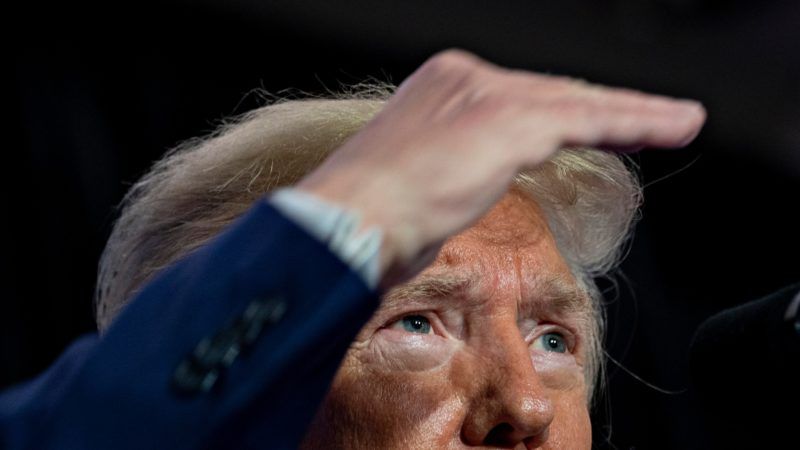The Trump Campaign Sues Another Newspaper
Plus: Judge rejects Gabbard's Google lawsuit, Bloomberg drops out, and more...

Donald Trump's reelection campaign says The Washington Post defamed the president. It's truly the golden era of frivolous defamation suits filed by political figures and groups who wish to quash free speech that doesn't suit them. (Sigh. Scream.) The latest of these legally dubious—but nonetheless threatening—endeavors comes from the Trump 2020 presidential campaign. After suing The New York Times for alleged libel last month, Donald J. Trump For President Inc. has now filed a complaint against The Washington Post.
In both cases, the president's people object to opinion pieces that were clearly labeled as such. Op-eds aren't immune from libel claims. But for something to rise to the level of defamation against a public figure (especially one so thoroughly public and newsworthy as the president of the United States), the item published must not only be false and reputation-damaging; it must issue from an entity that knew it was false and maliciously published it anyway.
As C.J. Ciaramella noted in February, "Trump has repeatedly opined that libel laws need to be 'opened up' to remove the strong protections that news outlets have enjoyed from defamation lawsuits since the landmark 1964 Supreme Court case New York Times v. Sullivan."
Since that case, "the American system of libel law has made it harder for public officials and public figures to recover," explains attorney Mike Godwin:
The theory is that the First Amendment provides stronger protections when people utter—or publish—critical opinions about politicians. This long-standing precedent does not please President Trump, who'd like to make it easier to sue his critics for libel (and win), and it recently has been criticized by Justice Clarence Thomas.
The new case, filed in the U.S. District Court for the District of Columbia, alleges that The Washington Post "published false and defamatory statements of and concerning the Campaign in two articles published in June 2019."
One piece, published June 13, 2019, concerned Special Counsel Robert Mueller's report on Russia and the Trump 2020 campaign (released last April). The lawsuit objects to a sentence in which the op-ed author characterized the report as saying the campaign "tried to conspire" with Russia.
The second piece concerned the 2020 election. The suit objects to this line: "Who knows what sort of aid Russia and North Korea will give to the Trump campaign, now that he has invited them to offer their assistance?"
It concludes that the newspaper published these pieces "as part of a systematic campaign of bias" against the Trump campaign.
You can read the whole complaint here.
Even if there's little chance Trump's campaign will prevail here, suits like these send a chilling message to journalists and publishers, especially when they're effectively coming from the leader of the country.
See also: "Whether or Not Trump's Libel Threat Violates the First Amendment, It's Clearly an Assault on Free Speech."
ELECTION 2020
Bye bye, Bloomberg! (And good riddance!) Former New York Mayor Michael Bloomberg quit his presidential campaign on Wednesday after failing to gain the Super Tuesday boost he was seeking.
Former Vice President Joe Biden ultimately got the most delegates on Super Tuesday, securing approximately 670. His chief rival, Sen. Bernie Sanders (I–Vt.), got 589.
QUICK HITS
- The Consumer Financial Protection Bureau is on trial.
- The FBI gets a rebuke from the FISA court.
- A judge has rejected the lawsuit that Rep. Tulsi Gabbard (D–Hawaii) filed against Google.
Show Comments (495)